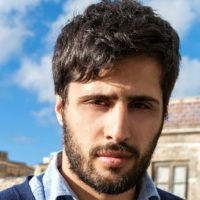
Manuel Naviglio
I was born in Rome on November 17, 1995. I attended the High School Qualification in classical studies and then, in September 2014, I started my undergraduate studies at the Sapienza University of Rome. In 2017, I got my Bachelor’s Degree in Physics under the supervision of Professor Guido Martinelli with the thesis entitled “Seconda quantizzazione in meccanica quantistica non relativistica”. In the same year, I started the M.Sc. in Theoretical Physics of fundamental interactions still at the Sapienza University of Rome. During my Master’s degree thesis work, carried out under the supervision of Professor Guido Martinelli, I got a Scientific Association at INFN that allowed me to work inside the group of Rome and in particular with Dr
Francesco Sanfilippo and Dr Silvano Simula. We focused on the calculation of the semi-leptonic form factors of heavy mesons and on the constraints that can be extracted by using unitarity at different values of the transferred momentum. INFN is engaged in this line of research in several experiments (LHCb, Atlas, CMS, Belle2). I obtained my Master’s Degree on January 2020 with grade 110/110 Cum Laude, defending the thesis entitled “Unitary constraints to the form factors
of the semi-leptonic disintegrations of heavy mesons”. After graduation, I won a public competition for the assignment of a freelance contract at Sapienza University and I continued my
Master’s Degree thesis work inside the group of Rome. I am interested in Theoretical High Energy Physics. In particular, my PhD research is devoted to the study of QCD in the non-perturbative regime using Monte Carlo lattice simulations and to the theories which can be relevant for our experimental frontiers in fundamental physics.
Besides Physics, my main interests are classic music, chess, history, photography, books, trekking, running, gardening and cooking.
PhD Theses
2024
Inverse Problems and non-equilibrium properties of Strong Interactions PhD Thesis
27.06.2024, (Relatore: Prof. Massimo D'Elia).
Presentations
2022
Inversion Methods for the LQCD computation of the electromagnetic conductivity of Quark Gluon Plasma Presentation
11.10.2022.
2021
Cosmological constraints on Dark Matter and the axion as a possible candidate Presentation
29.06.2021.
